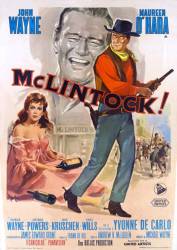
Question: After Wayne represents the Chiefs at their trial, his last words to them were in their language, and they responded in kind. What was said in their language, and the translation?
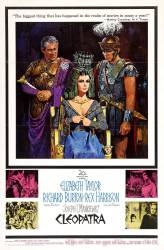
Question: During Rex Harrison's entire performance as Julius Caesar his arms and legs are covered by garments underneath his military garb and robes, even while in Egypt. The other Romans as would be expected have bare legs and arms. Was Harrison suffering from some skin condition or was he too shy or embarrassed of his limbs to show them in the film?
Answer: The people of higher rank would usually have more or better armor so in his case that would probably be extra armor for his legs and arms.
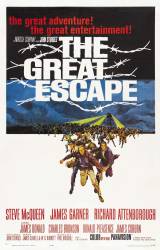
Question: How come Hilts could not answer the German at the end of the movie when he said he could speak German to Colonel von Luger?
Answer: .And, just to add to the previous answer: even if he could speak conversational German, he would likely do so with a very strong American accent (as he does when he speaks the few words to the Commandant earlier), so the guard would have picked up on that right away, anyway.
Answer: He could have only known a small amount of German, enough to answer a question or two, but not enough to carry on a full conversation. Also, the German seemed to be wanting to have a full conversation with him. He was on the run and didn't have time to talk. He was most likely being a smart ass saying he knew German.
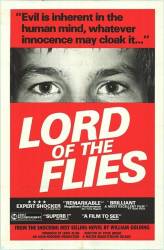
Question: One of the boys, called Piggy, wears glasses. Piggy's glasses become an important, prized object, because the boys can use the lenses to refract the sun's rays, and thus start fires. It is fairly well established, that, on a hot day, in bright sunshine, one can focus the sun's rays through a magnifying glass to set light to combustible material. (I've done it myself, although it took me rather longer than the book or film suggested, and it only made a very small flame.) But could you use spectacles, that people wear to correct defective vision, to start a fire in this way? Surely, if this was possible, wouldn't it mean that when people who wear glasses went out in hot sunny weather, then they would burn their eyes?
Answer: The key factor there is the focus of the light over distance. The light coming through the glass is refracted and focused on a single point. But it's bent like a ribbon. There is a "sweet spot" so to say where you have to hold the magnifying glass or lens at just the right distance and angle from the object to focus the center point of the light on it. Typically, this means holding the glass out a good several inches or even a foot or so away from what you wish to ignite to get the focal point of the light on it. Someone wearing glasses has them pretty much right up to their face. And so the light can't reach a focal point. Also keep in mind that for focusing the light through a lens, it needs to be angled just right for the light to go through it at the optimal angle and focus. Usually this means facing the sun directly. Typically people don't look up directly at the sun, at least not for more than a second. Especially with glasses on.
Answer: Only convex magnifying lenses can be used to focus the sun's rays in such a way as to start a fire. A convex magnifying lens is bowed outwards on both sides. Such lenses are found in magnifying glasses, binoculars and cameras, for examples. Conventional spectacles to correct vision are convex on one side and concave (bowed inward) on the other side, and so cannot be used to start fires. If Piggy's glasses are used to start fires, then he is wearing convex magnifying lenses (which would only be useful for up-close reading purposes, and they would be utterly useless for any other vision correction) ; and, if indeed he is wearing truly convex magnifying lenses for some reason, then his retinas could certainly be damaged by even glancing at the sun.
Answer: Lenses for nearsightedness would not work, but they could be corrected for the purpose by filling their concave areas with clear water, which would make the whole object correctly refract sunlight.
That's a reported "survival" trick (placing a drop of clear water in the center of a concave lens so as to focus the sun's rays) ; but I've never had any success with it.
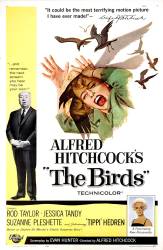
Question: When the birds attack the town a gas station attendant is hit by a bird and drops the gas hose he is using to fill a car. The gasoline flows down the street and under a car; a man drops a match and lights the gas causing an explosion. Why didn't the gas pump shut off when the man dropped it?
Answer: The movie takes place in the 1960s, so presumably gas pumps worked a bit differently back then. This is also a small town and probably the gas station had not modernized. There may not have been automatic shut-offs, or if there was, it was faulty.
The automatic shut off is in the handle of the hose. When a person grips the handle they have to lift a levered switch to allow gas flow; the lever is spring loaded so that if it is released the gas will stop flowing. I have looked at older antique gas pumps and they are all the same; even the visible glass gravity flow ones. If that hose was dropped the the gas should have stopped flowing.
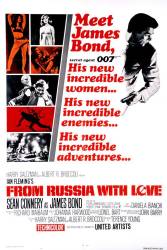
Question: When Bond hands Moneypenny the photo before he leaves, he writes "From Russia With Love" on it. Would this be another in a series of Bond sight gags, similar to stopping the bomb timer at "007" seconds in "Goldfinger"?
Chosen answer: It would, yes. Also I am to understand that it's his sense of humour.
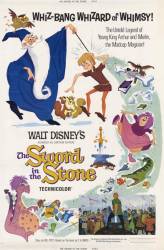
Question: Why is Arthur voiced by two actors?
Answer: Arthur was voiced by three actors. Rickie Sorenson and Richard and Robert Reitherman. Rickie originally voiced Arthur but, during production of the film, Rickie hit puberty causing his voice to change, so Wolfgang Reitherman chose to use his own sons to replace Rickie.
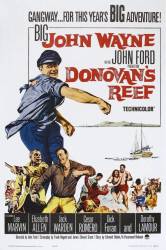
Question: This is regarding the scene in Boston. Why was that one gal smiling? Why did Amelia turn the lights out? Who were the three men Amelia told "You can go in now?
Answer: The lady smiling is one of Amelia's relatives who sits on the company board of directors. Being as she is elderly, she appears to be somewhat unaware of what exactly is going on and just sits there, apparently amused by the proceedings. The men were just waiting their turn to meet with the board, and of no significance to the story. Amelia's turning off the lights is just an exaggerated comedic gesture to show that she is on her way out and heading to Hawaii, that really makes no sense.
Answer: I think Amelia shutting off the lights was meant to imply she is extremely frugal and cautious with money, indicating she would more than likely scrutinize over judgment of her father (Doc Dedham).
Answer: I think it's her Irish frugality.
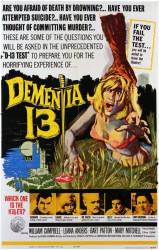
Question: At the very beginning, John and Louise stroll down a dock, get into a row-boat and start across the lake; but John dies of a heart attack half-way across, and Louise dumps his body into the water. Throughout this entire scene, John's transistor radio is warbling a rockabilly song that sounds Elvis-inspired (but it's not Elvis). What is the song and who sang it?
Answer: "He's Caught" by Buddy Fowler and the Fads. It was an unreleased song used for the movie.
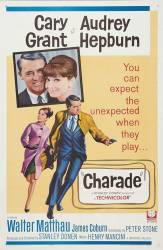
Answer: A ha alonney cha means live in harmony with the sun.